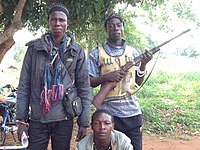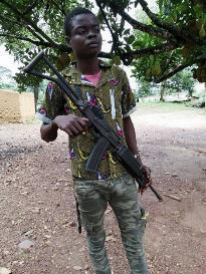The Anti-balaka (anti-machete) is an alliance[citation needed] of militia groups based in the Central African Republic in the early 21st century said by the Guardian to be composed primarily of Christians, but to include some Muslims.[3] However, some church leaders have contested the claimed exclusively Christian character of such groups.[4] The Tony Blair Faith Foundation and journalist Andrew Katz have noted that animists also participate in Anti-balaka groups.[5][6]
| Anti-balaka | |
|---|---|
 Anti-Balaka militia in Gbaguili, a village located 340 km from Bangui | |
| Leaders | See full list |
| Dates of operation | 2013–present |
| Headquarters | Bossangoa[1] (until 2021) N'Djamena, Chad (since 2021)[2] |
| Active regions | Central African Republic |
| Part of | Coalition of Patriots for Change (since 2020) |
| Opponents | Séléka and splinter groups (until 2020) |
| Battles and wars | Central African Republic Civil War (2012–present) |
This militia[clarification needed] formed in the Central African Republic after the rise to power of Michel Djotodia in 2013.[7] Amnesty International reported in 2015 that some members of anti-balaka groups have forcibly converted Muslims to Christianity.[8] Anti-balaka leaders have also been present at torture session of people accused of being witches in public ceremonies, and Anti-balaka have been accused of extorting money with witchcraft accusation, according to an internal UN report.[9]
Terminology
Though "anti-balaka" is often translated as "anti-machette", a different origin is also claimed:
[It is] from the language of the young illiterates, who formed Seleka's armed opposition, and who chased the Muslim 'anti-balles à ti laka' (anti ti laka bullets). The term 'laka' in the street language of the Central African Republic means an AK-47. The anti-balakas are therefore the bearers of grigris meant to stop Kalashnikov bullets.[10]
UN Congolese peace-keepers' murder and torture of Anti-balaka
According to Human Rights Watch Congolese peackeeping forces operating under the auspices of the UN, murdered a number of Anti-balaka, including a mass murder of 12 people, and tortured others.[11]
History
Some commentators have said that village militias formed in the 1990s to protect against highwaymen were a precursor to the Antibalaka.[7] Unable to provide security throughout the remote areas of the country, President François Bozizé organized, self-protection groups in 2009 to combat crime on the village level; these took the name Antibalaka.[5]
In March 2013, President Bozizé (a Christian) was overthrown by a coup during the Central African Republic Civil War by a mostly Muslim rebel coalition known as Séléka. The leader of the Séléka, Michel Djotodia, became the first Muslim president of the country.[12] With the disbanding of the army by Djotodia, many army members joined the militia, boosting their numbers and helping train them.[5]
Djotodia announced the dissolution of the Séléka in September 2013,[13] but most of the militias refused to disband.[14] The Séléka and the anti-balaka engaged in a cycle of increasing violence.[14][15]
As many Christians had more settled lifestyles and many Muslims were nomadic, competing claims to the land were another dimension of the tensions.[16] In November 2013, the UN warned that the country was at risk of spiraling into genocide,[17] and was "descending into complete chaos".[18] France described the country as "... on the verge of genocide".[19] On 2 December 2013, anti-balaka militiamen are suspected to have killed 12 people, including children, and wounded 30 others in an attack on the mostly-Muslim Fula in Boali, according to the government.[20] This was amidst the Central African Republic conflict under the Djotodia administration.

Early 2014 marked a turning point; hardened by war and massacres, the anti-balaka committed multiple atrocities.[6] In December 2013, UNICEF reported that in sectarian violence in Bangui, at least two children were beheaded and one of them was mutilated.[21]
2014
In 2014, Amnesty International reported several massacres committed by anti-balaka militias against Muslim civilians, forcing thousands of Muslims to flee the country.[22] On 13 January more than 100 people were killed by Anti-balaka in Bossemptélé massacre.[23]
In 2014, the corpse of Camille Lepage, a missing French photojournalist, was found by French soldiers in a truck used by Anti-Balaka members.[24]
On 24 June 100 Anti-balaka fighters attacked Bambari. 46 people were killed and 28 wounded.[25]
2017
On 9 May 2017 Anti-balaka attacked UPC forces in Alindao before withdrawing to Mingala.[26] On 13 May Anti-balaka attacked Bangassou killing more than 115 people including one peacekeeper.[27] On 18 May heavy clashes erupted between Anti-balaka and ex-Seleka in Bria resulting in 26 deaths.[28]
2018
On 31 October 2018 clashes broke out between anti-Balaka and ex-Séléka fighters in Batangafo resulting in at least 15 deaths.[29]
2019

In 2019, an Anti-balaka leader in Satema killed a 14-year-old girl in a ritualistic way to increase profit from mines.[30]
2020
- 3 August: Anti-balaka attacked Grimari blocking roads to Sibut and Bambari. FACA managed to recapture city the same day killing one Anti-balaka commander.[31]
- 23 October: Clashes erupted between two factions of Anti-balaka in Batangafo.[32] Clashes were also reported later between Anti-balaka and ex-Séléka in the city. Seven people were killed (including three civilians and four militiamen) and more than 100 injured.[33]
- 17 December: Anti-balaka joined Coalition of Patriots for Change.[34]
- 26 December: Anti-balaka fighters from Kaga-Bandoro attacked Dekoa killing three Burundian peacekeepers. Three militiamen were arrested by MINUSCA forces.[35]
2021
Since 2021 large number of former Anti-balaka fighters were recruited by Wagner Group into so-called Black Russians. They were responsible for numerous war crimes, including 2021 Boyo killings.[36]